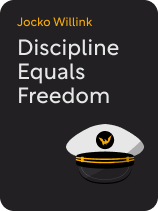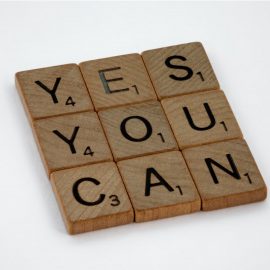

This article is an excerpt from the Shortform book guide to "Discipline Equals Freedom" by Jocko Willink. Shortform has the world's best summaries and analyses of books you should be reading.
Like this article? Sign up for a free trial here.
What is Discipline Equals Freedom about? What are the main takeaways of the book?
In Discipline Equals Freedom, Jocko Willink argues that the key to reaching your highest goals and discovering your full potential is unwavering discipline. He offers his principles to master self-discipline.
Read below for an overview of Discipline Equals Freedom by Jocko Willink.
Discipline Equals Freedom by Jocko Willink
The book Discipline Equals Freedom by Jocko Willink skips the motivational fads and fluff to deliver the harsh but empowering truth that simple, relentless discipline is the key to becoming the best version of yourself. If you want to master your mind, become healthier, and achieve your highest goals, practicing discipline will drive the actions necessary to do so.
Willink developed his philosophy of discipline based on 20 years of experience as a US Navy SEAL. Since his retirement from the military, Willink has promoted principles like discipline and responsibility through his leadership training program, Echelon Front, in books like Extreme Ownership, and in his podcast. In Discipline Equals Freedom, Willink encapsulates his philosophy of discipline, considering it from a variety of angles and presenting his thoughts in a rapid-fire, drill instructor style.
In the book, Willink covers:
- The importance of self-discipline: what it is and why you need it to improve your life.
- How to cultivate discipline: finding your drive, establishing long-term goals, and achieving these through incremental self-improvement.
- Overcoming obstacles to discipline: strategies to combat procrastination, invalidate false excuses, and persevere through challenges that seem overwhelming.
- How to apply discipline to your daily life: practical ways to make discipline part of your regular routine.
Willink circles around the idea of discipline, approaching it from many angles and considering its application to different situations. Because this style and structure create repetition, we’ve consolidated and reorganized these points into sections, focusing on one idea at a time.
The Importance of Self-Discipline
First, we’ll discuss the kind of discipline Willink focuses on in this book: self-discipline, which Willink advocates above all other influences to get things done. We’ll explain what self-discipline is, distinguishing it from motivation and external discipline. Then, we’ll explore why it’s important to implement this discipline in your life.
What Is Self-Discipline?
Self-discipline is a steady, internal force that drives you to take action and “be better.” Willink explains that motivation or discipline from someone else—for instance, a motivational speaker or drill instructor—is a temporary influence that’s unreliable and outside your control. In contrast, self-discipline is consistent willpower that you exert over your mind and body enabling you to do what’s necessary to reach your goals despite your feelings or external influences.
How to Cultivate Discipline
Now that you know what self-discipline is and why Willink believes it’s beneficial, we’ll explain how to develop and implement this discipline in your own life. In order to sustain discipline, it’s important to establish reasons for it. Willink explains how his own underlying drives have pushed him to keep improving throughout his life. Similarly, you’ll lay the foundation for your discipline by identifying your drive. After you identify your reason to be a better person, the next step will be deciding how you’re going to achieve this by establishing a concrete, long-term goal and progressing toward it incrementally.
Overcome Obstacles to Discipline
Even after you establish your underlying drive, set long-term goals, and begin to pursue these with incremental progress, your discipline can falter. We’re all human and nobody is perfect. Some days might bring overwhelming challenges or obstacles that are out of your control.
However, if you let obstacles stop you, you’ll disrupt your progress toward health, happiness, and your long-term goals. Willink describes several strategies to combat the obstacles of procrastination, fear of failure, and factors that are out of your control.
Apply Discipline to Your Daily Life
Now that you understand why discipline is important, how to cultivate it, and what to do when your discipline is challenged, you’ll be better equipped to apply discipline in your regular routine. Although discipline is a principle that should affect all spheres of life, Willink highlights a few key areas of daily life in which to apply discipline for excellent health and self-improvement:
- Exercise
- Diet
- Sleep

———End of Preview———
Like what you just read? Read the rest of the world's best book summary and analysis of Jocko Willink's "Discipline Equals Freedom" at Shortform.
Here's what you'll find in our full Discipline Equals Freedom summary:
- Lessons and the philosophy of discipline from a Navy SEAL
- The importance of daily habits like waking up early and putting off breaks
- How self-sabotage actually stems from laziness






